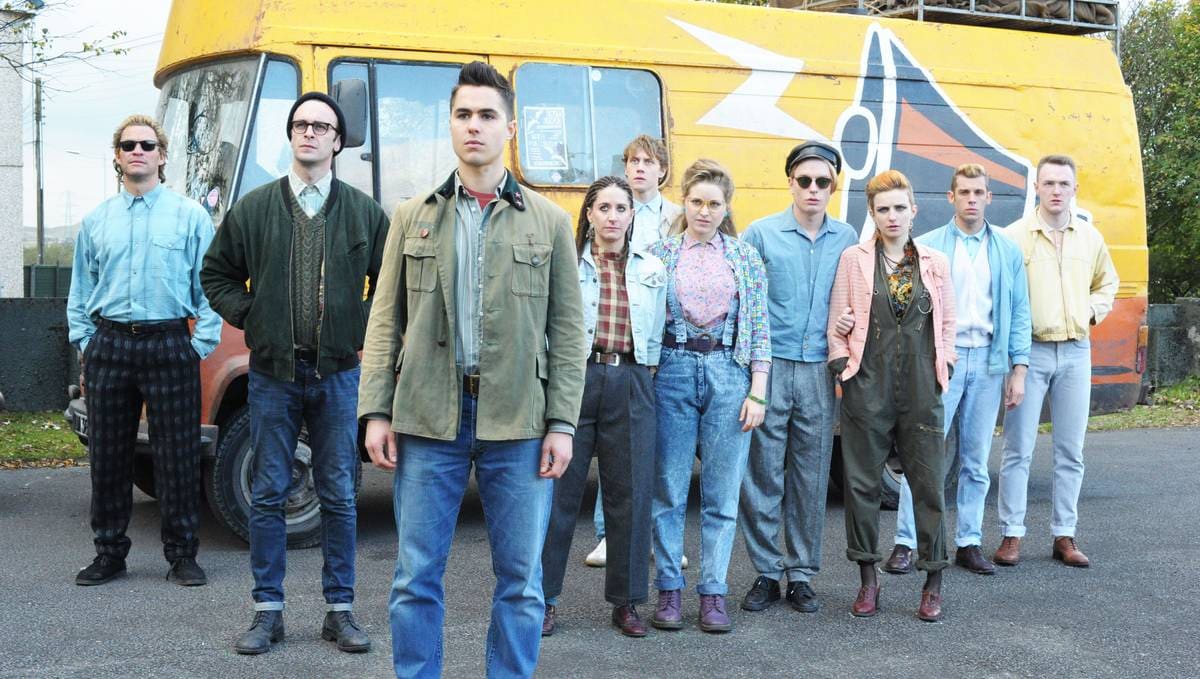Dominic West as Jonathan Blake shows off his dancing skills to the villagers of the mining town Onllwyn, here with Imelda Staunton as Hefina. The reality show’s Jonathan Blake said he had a twinge of guilt about making the star do such a raucous dance.
Photo: Arthouse

Jonathan Blake of reality. It was his story that became the basis for the film ‘Pride’. Blake was one of the first people in the UK to be diagnosed with HIV. He never expected to live 31 years after learning about the virus.
Photo: Espen Aas / NRK
For nearly a year, from March 1984, British miners defied Margaret Thatcher’s government, refusing to return to work over plans to close 20 coal mines.
The strikers’ families and the local community provided their support as best they could, but the funds available for many things were insufficient.
But in London a small group of gays and lesbians got together and decided to support the striking miners. They founded “LGSM” which stands for “Lesbian and Gaymen Support The Miners” or “Lesbians and gays support the miners”.
The story of this rather unusual alliance has been turned into a film, “Pride”, with a number of famous actors in the cast.
Know how they feel
One of those who helped found “LGSM” was named Jonathan Blake, and the film is based on his account of what happened some 30 years ago.
NRK met him in London, where he lived in the same district, and since then, with the same partner.
– Making a film about a part of someone’s life, and also a part of one’s life that one is really proud of, is amazing, it’s amazing, says Blake happily.
Article continues below image.

Marching Miners at Onllwyn. Paddy Considine plays Dai, who chooses to accept support from London. Beside him, Bill Nighy as Cliff was also one of the first to welcome ‘LGSM’.
Photo: Arthuas
Will support the strikers

Exterior of ‘Gay’s The Word’ as seen in the film. Standing outside are Dominic West as Jonathan, Faye Marsay as Steph and George Mackay as Joe who collects money for the miners.
Photo: Arthaus

What ‘Gay’s The Word’ really looks like.
Photo: Espen Aas / NRK
At the “Gay’s The Word” bookstore which was still a few minutes’ walk from Russell Square in central London, Jonathan and his friends decided they would support the strikers.
They know all about what it’s like to be outside most of the yard.
– We are activists, we understand the point. “Our daily life is about the state being against us, you can be stopped on the street by the police, anything can happen,” he said.
At that time, the minimum sexual age for homosexuals was 21 years, while for heterosexuals it was 16 years.
This could be bad for you if you are with someone under 21 years of age. Against the backdrop of this challenge, the gang begins to raise money in the capital.
Article continues below image.

In the bookstore ‘Gay’s The Word’, a group of gays and lesbians set up an association to support the striking miners. Here we see Freddie Fox as Jeff, Joseph Gilgun as Mike, Ben Schnetzer as Mark and Fate Marsay as Steph.
Photo: Arthouse
Ends in Wales
The film depicts the challenges the gang faces in London in getting the money collected to donate to the miners. The powerful miners’ union did not want to associate with the gay community in London and did not want to talk to them.
But in the small village of Onllwyn in the Dulais Valley in Wales, someone thought differently and invited them down. There is a cultural clash between urban homosexuals and rural residents, but in the end these two very different groups find each other. However, everyone is not completely comfortable with the “heretic” gang from London.
Among the famous actors we find Bill Nighy (“Love Actually” and others), Imelda Staunton (“Harry Potter”, “Vera Drake” and others) and Andrew Scott (“Sherlock”), while Jonathan Blake is played by Dominic Blake (” The Wire”), which he greatly appreciated.
Even so, he admitted that he felt a little guilty because he performed a lewd dance scene on a famous actor in the film.
– There is a photo of me dancing at a charity event for miners. I clapped my hands in pure joy. From this one scene, Dominic is given a four and a half minute long dance scene – which he does superbly. I think it took him four and a half months to learn it. All I can say is if I could dance like Dominic West did in that movie, I would be a very happy gay man, grins Blake.
Article continues below image.

Residents of the mining town of Onllwyn are invited to London and allowed to join a gay bar, much to their delight. Gethin (Andrew Scott) dances with Hefina (Imelda Staunton).
Photo: Arthouse
Return
It all culminated in a huge concert supporting the miners in London entitled “Pits and heretics”, taken from a headline in the tabloid newspaper The Sun, which was not very supportive of their work.

Not all Onllwyn residents are equally enthusiastic about getting help from the homies from London. Maureen (Lisa Palfrey) and sons Johnny (Johnny Gibbon, tv) and Lee (Dyfan Dwyfor) call them deviants and want nothing to do with each other.
Photo: Arthouse
Despite funding from there and other support from “LGSM”, the mining strike that lasted almost a year finally ended in March 1985, and eventually most of them also lost their jobs when the operation was closed. But the Dulais Valley Miners’ Union had not forgotten their strange friends in London.
Jonathan Blake and his friends noticed that when they were about to participate in the large gay pride parade that same year.
– Absolutely incredible, we were told to go to the back of the parade, the organizers didn’t want a political parade, this should be a carnival. Then came the South Wales Miners’ Association, with brass bands and all that. Then everything changed, and we moved on, Blake said.
Bus after bus full of miners arrived in London, and a large turnout finally pushed for gay rights in England.
The South Wales Mineworkers’ Union is pushing its main union to persuade the British Labor Party to improve gay rights. Gradually, the minimum sexual age was lowered to 18 years, and then to 16 years for heterosexuals.
They could hardly have received a better thank you for their help.
Article continues below image.

After the miners’ strike was over, the South Wales Miners’ Union went to London to support their old friends in the huge Gay Pride parade in 1985. They had their own brass band and were allowed to walk at the front of the parade.
Photo: Arthouse
Award winner

Dominic West, known from the success of the series ‘The Wire’, plays Jonathan Blake in the film ‘Pride’. Here he greets old friends from the mining town of Onllwyn who have come to London to take part in the big Gay Pride parade.
Photo: Arthouse
Although the film “Pride” was first shown in Norway over Christmas, it has been playing in cinemas in the UK since September.
The film was nominated for a Golden Globe next year in the “best motion picture, musical or comedy” category.
Under the “British Independent Film Awards” the film was nominated in seven categories, and won three of them, “best British independent film”, “best supporting actress” (Imelda Staunton) and “best supporting actor” (Andre Scott). At Cannes, the film received the “Queer Palme” for best film with lesbian, gay, bisexual or transsexual related content.

“Freelance bacon fanatic. Amateur internet scholar. Award-winning pop culture fan.”







